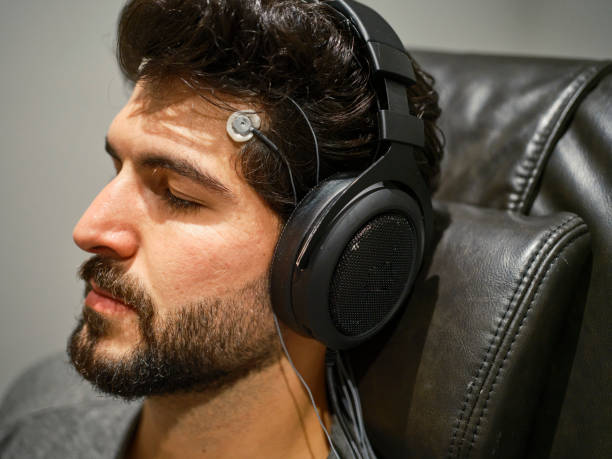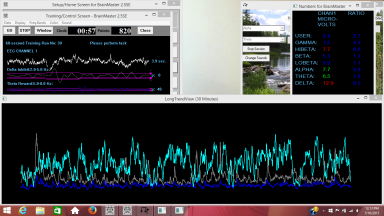Sleep Improvement Technology: For Insomnia

.
Introduction
Biohacking involves making small, strategic changes to the body and mind to optimize performance, health, and well-being. This movement blends biology, technology, and self-experimentation. Enthusiasts, known as biohackers, use various techniques ranging from dietary adjustments to advanced technologies. This method enhances mental and physical capabilities beyond natural limits. Biohacking covers a broad spectrum, including nutrition, exercise, and sleep. It often involves tracking bodily functions and experimenting with interventions to find what works best for each individual. As biohacking gains popularity, more people are exploring its potential to improve their sleep and overall quality of life. This article delves into the latest sleep improvement technologies that biohackers are using to combat Insomnia, offering insights into cold water immersion, repetitive transcranial magnetic stimulation (rTMS), and alpha/theta neurofeedback training.
Cold Water Immersion and Sleep
Cold water immersion (CWI) is gaining attention for its potential to enhance sleep. Research on well-trained male endurance runners shows that the depth of cold water immersion impacts sleep architecture and recovery. A study found that deeper immersion led to better sleep quality and faster recovery. Participants immersed in cold water up to their necks experienced significant improvements in sleep duration and efficiency. They reported feeling more refreshed and recovered after sleep.
The study suggests that CWI may increase parasympathetic nervous system activity, which promotes relaxation and better sleep. It also highlights the importance of water temperature. The optimal range for promoting sleep is around 15-20°C. This temperature range helps reduce core body temperature, facilitating sleep onset.
Overall, CWI is a promising technique for improving sleep in athletes and individuals with Insomnia. It offers a natural, drug-free alternative that can be easily incorporated into a nightly routine. However, more research is needed to understand the long-term effects and optimal protocols for different populations.
Repetitive Transcranial Magnetic Stimulation (rTMS) and Insomnia
Repetitive transcranial magnetic stimulation (rTMS) is a procedure that uses repurposed MRI technology to stimulate brain activity. It’s being explored as a treatment for Insomnia. A protocol for a systematic review of the effects of rTMS for Insomnia suggests it could be a viable option for those struggling with sleep disorders.
The review focuses on applying rTMS to specific brain regions associated with sleep regulation. Early findings indicate that rTMS can improve sleep quality by modulating neural activity. Patients undergoing rTMS treatment reported reduced sleep latency and increased sleep duration. They also experienced fewer awakenings during the night.
One of the main advantages of rTMS is its non-invasive nature. Unlike medication, it doesn’t have systemic side effects. This makes it an attractive option for individuals seeking alternative treatments for Insomnia. The review aims to consolidate evidence and provide clear guidelines for rTMS application in insomnia treatment.
While promising, rTMS is still in the early stages of research. Larger, more long-term research is needed to determine the optimal treatment parameters. Nevertheless, rTMS represents a cutting-edge approach to tackling Insomnia and improving sleep quality.
Alpha/Theta Neurofeedback Training and Sleep
Alpha/theta neurofeedback training is another innovative technique aimed at improving sleep. It involves training individuals to control their brainwave patterns to promote relaxation and better sleep. A study on the difficulty of staying awake during alpha/theta neurofeedback training reveals exciting insights.
Participants often found it challenging to stay awake during sessions. This difficulty indicates deep relaxation, which is beneficial for sleep. The study observed significant increases in alpha/theta activity, which are connected with nocturnal tranquility and the transition from wakefulness to sleep.
Alpha/theta neurofeedback training can help individuals with Insomnia by teaching them to enter a relaxed state more easily. This training enhances the ability to shift from beta brainwaves (associated with alertness) to alpha and theta brainwaves. As a result individuals can experience more restful sleep.
The study highlights the potential of neurofeedback as a tool for managing Insomnia. However, it also notes the need for personalized training protocols. Individuals may respond differently to neurofeedback, requiring tailored approaches for maximum effectiveness.
In conclusion, alpha/theta neurofeedback training offers a promising avenue for improving sleep. It provides a non-invasive, drug-free method that allows patients to re-stabilize of their sleep patterns. This technology could become a standard part of insomnia treatment as research progresses.
Natural Biohacks for Better Sleep
Improving sleep arcitecture can have profound effects on overall health and well-being. Several hacks can help achieve this. First, maintaining a consistent sleep schedule helps regulate the body’s internal clock. Going to bed and waking up simultaneously every day reinforces the sleep-wake cycle. Second, optimizing the sleep environment is crucial. This technique involves keeping the bedroom cool, dark, and quiet and investing in comfortable mattresses and pillows.
Third, limiting exposure to screens before bedtime is essential. Blue light filters or avoiding screens an hour before bed can mitigate this effect. Fourth, incorporating relaxation techniques like meditation, deep breathing, or progressive muscle relaxation can help calm the mind and prepare the body for sleep. Finally, natural supplements like magnesium, melatonin, or valerian root can support sleep quality. These hacks, when combined, create a holistic approach to improving sleep naturally, promoting better rest and overall health.
Conclusion
Sleep improvement technology is advancing rapidly, offering new hope for those struggling with Insomnia. Cold water immersion, rTMS, and alpha/theta neurofeedback training represent cutting-edge approaches that can complement traditional treatments. These technologies offer natural, non-invasive alternatives that can be tailored to individual needs. As research continues, they may become vital tools in the fight against Insomnia, helping millions achieve better sleep and improved quality of life.
References:
https://www.forbes.com/health/wellness/biohacking/
https://www.ncbi.nlm.nih.gov/pmc/articles/PMC8044518/
https://www.ncbi.nlm.nih.gov/pmc/articles/PMC6661550/

